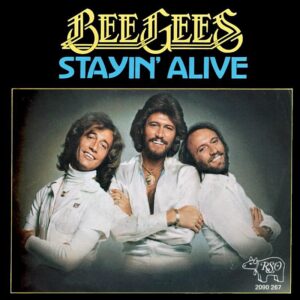Bee Gees – Night Fever: The Anthem of the Disco Era
“Night Fever,” a hit single by the Bee Gees, is widely regarded as one of the defining anthems of the disco era. Released in 1977 as part of the soundtrack for the movie “Saturday Night Fever,” this song encapsulates the energetic and vibrant spirit of the late 1970s. The success of “Night Fever” not only solidified the Bee Gees’ status as disco icons but also played a significant role in shaping the musical landscape of the time.
The creation of “Night Fever” was a result of the Bee Gees’ collaboration with producer Robert Stigwood, who was heavily involved in the development of the “Saturday Night Fever” soundtrack. The Gibb brothers—Barry, Robin, and Maurice—crafted a track that perfectly captured the essence of the disco movement. With Barry Gibb’s distinctive falsetto leading the way, the song featured lush harmonies, a driving beat, and a memorable string arrangement that became hallmarks of the disco sound.
“Night Fever” quickly rose to prominence, topping the charts in multiple countries, including the United States, where it held the number one spot on the Billboard Hot 100 for eight consecutive weeks. The song’s infectious rhythm and catchy melody resonated with audiences, making it a dance floor staple. Its success was mirrored by the “Saturday Night Fever” soundtrack, which became one of the best-selling soundtracks of all time.

The impact of “Night Fever” extended beyond the music charts. The song, along with other hits from the soundtrack, played a crucial role in popularizing disco music and culture. It helped propel the Bee Gees to international stardom and made “Saturday Night Fever” a cultural phenomenon. The film, starring John Travolta, showcased the dance moves and fashion of the disco era, further cementing the Bee Gees’ place in music history.
Night Fever” is characterized by its upbeat tempo, groovy bassline, and orchestral strings, which create a sense of urgency and excitement. The song’s arrangement is meticulously crafted, with layers of instrumentation that build upon each other to create a rich, full sound. Barry Gibb’s falsetto vocals add an ethereal quality to the track, while the harmonies provided by Robin and Maurice Gibb enhance its overall texture.
The lyrics of “Night Fever” reflect the carefree and hedonistic spirit of the disco era. Lines like “Here I am, praying for this moment to last” and “We know how to do it, gimme that night fever” evoke a sense of living in the moment and enjoying the nightlife. The song’s repetitive chorus reinforces its danceable nature, making it an irresistible invitation to the dance floor.
The legacy of “Night Fever” endures to this day. The song remains a favorite at dance parties and retro-themed events, and its influence can be heard in the work of contemporary artists who draw inspiration from the disco sound. The Bee Gees’ contribution to music through “Night Fever” and other hits from the “Saturday Night Fever” soundtrack is undeniable, and their work continues to be celebrated by fans old and new.
“Night Fever” by the Bee Gees is more than just a hit song; it is a cultural artifact that encapsulates the energy and excitement of the disco era. Its lasting impact on music and popular culture is a testament to the talent and creativity of the Gibb brothers, whose legacy continues to shine brightly in the annals of music history.
The Bee Gees, consisting of brothers Barry, Robin, and Maurice Gibb, have an extensive catalog of hits spanning several decades. Some of their greatest and most memorable hits include:
“Stayin’ Alive” – One of their most iconic songs, featured in the soundtrack of the movie “Saturday Night Fever.”
“How Deep Is Your Love” – A romantic ballad that also appeared in “Saturday Night Fever.”
“Night Fever” – Another hit from the “Saturday Night Fever” soundtrack.
“Tragedy” – Known for its dramatic style and powerful vocals.
“Jive Talkin'” – A funk-influenced track that marked a stylistic shift for the group.
“You Should Be Dancing” – A disco anthem that became a major dance hit.
“More Than a Woman” – Another classic from the “Saturday Night Fever” soundtrack.
“To Love Somebody” – A soulful ballad that has been covered by many artists.
“Massachusetts” – One of their earlier hits, showcasing their harmonizing skills.
“I Started a Joke” – A melancholic ballad featuring Robin Gibb’s distinctive voice.
These songs not only defined the Bee Gees’ career but also left a significant impact on the music industry, particularly during the disco era.